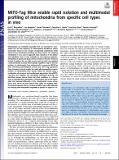| dc.contributor.author | Bayraktar, Erol C. | |
| dc.contributor.author | Baudrier, Lou | |
| dc.contributor.author | Özerdem, Ceren | |
| dc.contributor.author | Lewis, Caroline A. | |
| dc.contributor.author | Chan, Sze Ham | |
| dc.contributor.author | Kunchok, Tenzin | |
| dc.contributor.author | Abu-Remaileh, Monther | |
| dc.contributor.author | Cangelosi, Andrew L. | |
| dc.contributor.author | Sabatini, David M. | |
| dc.contributor.author | Birsoy, Kıvanç | |
| dc.contributor.author | Chen, Walter W. | |
| dc.date.accessioned | 2020-05-06T19:42:07Z | |
| dc.date.available | 2020-05-06T19:42:07Z | |
| dc.date.issued | 2018-12 | |
| dc.date.submitted | 2018-09 | |
| dc.identifier.issn | 0027-8424 | |
| dc.identifier.issn | 1091-6490 | |
| dc.identifier.uri | https://hdl.handle.net/1721.1/125078 | |
| dc.description.abstract | Mitochondria are metabolic organelles that are essential for mammalian life, but the dynamics of mitochondrial metabolism within mammalian tissues in vivo remains incompletely understood. While whole-tissue metabolite profiling has been useful for studying metabolism in vivo, such an approach lacks resolution at the cellular and subcellular level. In vivo methods for interrogating organellar metabolites in specific cell types within mammalian tissues have been limited. To address this, we built on prior work in which we exploited a mitochondrially localized 3XHA epitope tag (MITO-Tag) for the fast isolation of mitochondria from cultured cells to generate MITO-Tag Mice. Affording spatiotemporal control over MITO-Tag expression, these transgenic animals enable the rapid, cell-type-specific immunoisolation of mitochondria from tissues, which we verified using a combination of proteomic and metabolomic approaches. Using MITO-Tag Mice and targeted and untargeted metabolite profiling, we identified changes during fasted and refed conditions in a diverse array of mitochondrial metabolites in hepatocytes and found metabolites that behaved differently at the mitochondrial versus whole-tissue level. MITO-Tag Mice should have utility for studying mitochondrial physiology, and our strategy should be generally applicable for studying other mammalian organelles in specific cell types in vivo. | en_US |
| dc.description.sponsorship | NIH (Grant R01CA103866) | en_US |
| dc.description.sponsorship | NIH (Grant R01CA129105) | en_US |
| dc.description.sponsorship | NIH (Grant R37AI047389) | en_US |
| dc.description.sponsorship | Department of Defense (Grant W81XWH-15-1-0230) | en_US |
| dc.language.iso | en | |
| dc.publisher | National Academy of Sciences | en_US |
| dc.relation.isversionof | http://dx.doi.org/10.1073/pnas.1816656115 | en_US |
| dc.rights | Article is made available in accordance with the publisher's policy and may be subject to US copyright law. Please refer to the publisher's site for terms of use. | en_US |
| dc.source | PNAS | en_US |
| dc.title | MITO-Tag Mice enable rapid isolation and multimodal profiling of mitochondria from specific cell types in vivo | en_US |
| dc.type | Article | en_US |
| dc.identifier.citation | Bayraktar, Erol C. et al. "MITO-Tag Mice enable rapid isolation and multimodal profiling of mitochondria from specific cell types in vivo." Proceedings of the National Academy of Sciences 116, 1 (December 2018): 303-312 © 2019 National Academy of Sciences | en_US |
| dc.contributor.department | Massachusetts Institute of Technology. Department of Biology | en_US |
| dc.relation.journal | Proceedings of the National Academy of Sciences | en_US |
| dc.eprint.version | Final published version | en_US |
| dc.type.uri | http://purl.org/eprint/type/JournalArticle | en_US |
| eprint.status | http://purl.org/eprint/status/PeerReviewed | en_US |
| dc.date.updated | 2019-09-16T13:07:12Z | |
| dspace.date.submission | 2019-09-16T13:07:14Z | |
| mit.journal.volume | 116 | en_US |
| mit.journal.issue | 1 | en_US |
| mit.metadata.status | Complete | |
